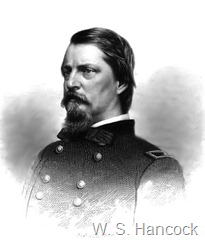August 29.—The battle of Groveton, in the vicinity of Bull Run, was fought by the Union army, under Gen. Pope, and two divisions of the rebel forces, under Generals Jackson and Longstreet. The engagement commenced early in the morning, and terminated only at night, the rebels being driven from the field with great loss.—(Doc 104 and Supplement.)
—Twelve officers of the Seventy-first regiment of Ohio volunteers having published a card, stating that they advised Colonel R. Mason, who had been cashiered for cowardice, to surrender Clarksville, Tenn., to the rebel forces, were, by direction of the President, dismissed from the service of the United States.
—At Wilmington, Del., an enthusiastic meeting was held, at which resolutions were adopted denouncing Governor Burton as a rebel and a tool of Bayard, and appointing a committee to lay the proceedings of the meeting before the President and Secretary of War. Resolutions were also adopted expressing a determination to resist the draft as made by the Governor.
—Brig.-Gen. W. F. Barry, late Chief of Artillery, under Gen. McClellan, was assigned to duty as Inspector-General of Artillery, and ordered to report to the Chief of Ordnance.
—The Secretary of War issued an order directing that the Seventy-first regiment New-York State militia be sent to New-York on the thirty-first instant, and then mustered out of the United States service, the time for which they volunteered having expired.—Lieut Godfrey Weitzel, of the Engineer Corps, was this day appointed a Brigadier-General.—A meeting called twelve miles south-east of Memphis, Tenn., to organize a guerrilla band, was surrounded and eighteen prisoners were captured by a company of National troops.
— A skirmish took place near Manchester, Tenn., between a small force of Union infantry, under the command of Captain Miller, Eighteenth Ohio, and a force of rebel cavalry, under General Forrest, resulting in the retreat of the latter, with very heavy loss.—Cincinnati Commercial.
—A reconnoitring expedition, consisting of two companies of infantry, a battery of two guns, and a small troop of cavalry, under the command of Col. Thomas, Eighth Vermont, left St Charles Court-House, La., and proceeded to Bonnet Carré, where they dispersed, after a short skirmish, a force of rebel guerrillas, and captured over fifteen head of oxen, horses, and mules, which were designed for the use of the rebel army. The expedition was entirely successful, and returned without losing a man.—N. O. Delta, Sept. 1.
—The Union gunboat Anglo-American, under the command of Captain Riley, left New-Orleans and proceeded up the Mississippi River on a reconnoitring expedition, as far as Vicksburgh. When opposite Port Hudson the Anglo-American received the fire of twenty-two guns. She was hit sixty or seventy times, but though completely riddled, proceeded on her course. The result of the reconnoissance was entirely successful.



